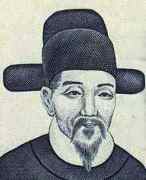Person: Guangqi, Xu

Xu Guang-qi was a Chinese mathematician who made Western mathematics available by translating works into Chinese.
Mathematical Profile (Excerpt):
- It was therefore a natural consequence that figures like Xu Guang-qi and others appeared during this period of 'Renaissance'.
- Xu Guang-qi was well aware of this and attributed the decline to academics neglecting practical learning and also to a confusion between mathematics and numerology.
- Even the Nine Chapters on the Mathematical Art was almost unknown, and Xu Guang-qi himself had never read the brilliant Chinese classic, while The Ten Classics were thought to have been lost.
- He taught mathematics to Chinese students and one of these was the high-ranking public official Xu Guang-qi.
- Xu Guang-qi became the first native of China to publish translations of European books into Chinese.
- The first six books of Euclid's Elements were translated into Chinese in 1607 by Ricci and Xu Guang-qi.
- Ricci and Xu Guang-qi's translation respects the order of Clavius's work completely; however, it is much less verbose ...
- Clearly Xu Guang-qi was a total convert to Western thinking but most other Chinese mathematicians stuck to their traditional way of thinking, questioning what to them was absurd such as "a point has no part".
- The Chinese approach to mathematics had been highly practical and to try to fit the Elements into that tradition Xu Guang-qi explained in his preface how the contents had application to the problem of the calendar, to music and to technology.
- However the new Chinese terminology which Xu Guang-qi had to invent for point, curve, parallel line, acute angle, obtuse angle etc.
- (these concepts being alien to Chinese mathematics, there were no Chinese words for them) soon became part of Chinese mathematics, as did the style of the geometric figures, in particular the characters Xu Guang-qi chose to label them.
- In one sense Xu Guang-qi did a disservice to Chinese mathematics.
- Xu Guang-qi was already interested in calendar reform before he met Ricci, so he was soon involved in the debate.
- Three different predictions were made, one by the Da Tong traditional Chinese school, one by the Islamic calendar school, and one by the New Method School led by Xu Guang-qi which used European methods.
- The most accurate prediction for the eclipse of 21 June 1629 was made by Xu Guang-qi and the emperor then appointed him take charge of calendar reform.
- Four European Jesuits assisted Xu Guang-qi but the reform process had not been completed on his death in 1633 and was taken over by Li Tang-jing.
- During the last few years of his life Xu Guang-qi was an extremely influential figure at the Imperial Court of the Ming Dynasty.
- Xu Guang-qi, with his strong belief in the superiority of all things European, persuaded the Ming emperor to have his army adopt advanced European artillery against the Manchu.
- Initially effective, the strategy collapsed after Xu Guang-qi's death when the Manchu learned European iron-smelting technology and acquired Western arms themselves.
Born 24 April 1562, Shanghai, China. Died 8 November 1633, China.
View full biography at MacTutor
Tags relevant for this person:
Ancient Chinese, Astronomy, Chinese, Origin China
Thank you to the contributors under CC BY-SA 4.0! 

- Github:
-

- non-Github:
- @J-J-O'Connor
- @E-F-Robertson
References
Adapted from other CC BY-SA 4.0 Sources:
- O’Connor, John J; Robertson, Edmund F: MacTutor History of Mathematics Archive
